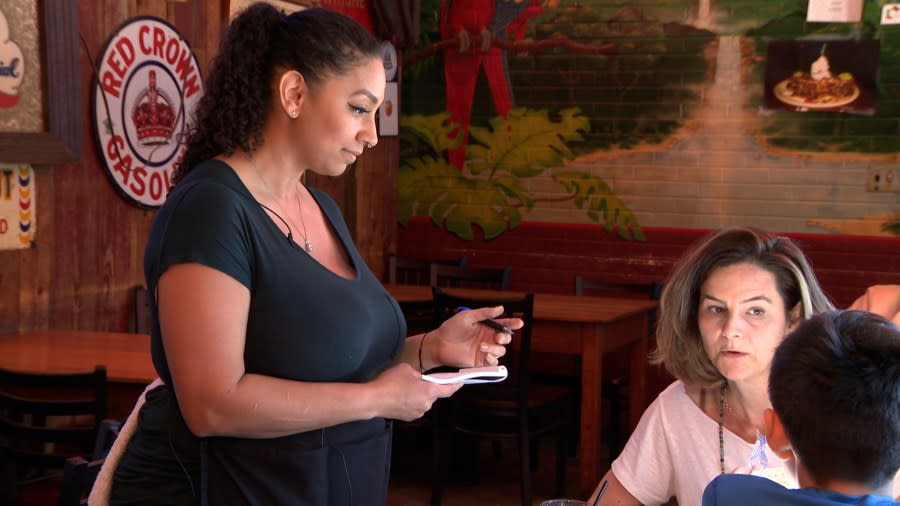Texas Restaurant Association creating child care pilot program for hospitality employees
AUSTIN (KXAN) — Many families struggle to find reliable and affordable childcare. For those in the food service industry, there’s an added barrier: working non-traditional hours.
RELATED COVERAGE: Food service industry now largest private sector employer in Texas
“We know that traditional hospitality employees do not work a standard 9 a.m. to 5 p.m.,” said Executive Director for the Central South Region of the Texas Restaurant Association, Madison Gessner.
It’s a problem the Austin chapter of the Texas Restaurant Association is trying to address. It put out a survey to understand the challenges workers experience with child care.
“We needed to put together a survey that evaluated what the needs were, what people could afford and where they needed childcare,” Gessner said. “We could take those survey results and take it back with United Way and look at a pilot program with a provider to look at nontraditional-hour care.”
The goal is to have the pilot program by the end of the summer. If it is successful, Gessner said they’ll take the data back to the City of Austin to try and create a larger partnership with them.
“We know that shift work is not exclusive to the hospitality industry. There are many industries that are impacted by non-traditional hours,” Gessner said. “What can we do to bring this data and this model and see if we can build something bigger?”
The survey’s findings
The survey posed seven questions and Gessner said 64 parents responded. She said participants reported from 31 different zip codes.
“It’s kind of all over the county in the cities surrounding Austin,” Gessner said. “We know that a lot of our hospitality workers may commute in.”
According to the results, a majority of participants had children between the ages of 5-years-old and under.
RELATED COVERAGE: Child care in Travis County is the most expensive in Texas, new data show
“We know that the needs for older children are different than the needs for toddler-aged children,” Gessner said. “Infant care is a whole other situation. We wanted to kind of isolate down the different age groups that we were looking at and the needs within them.”
A vast majority said they didn’t have reliable childcare, according to the results.
“68.1% of our respondents said that they had part-time care, but it was inconsistent at times and did not cover all of their working hours.”
Madison Gessner, Texas Restaurant Association
When it comes to the cost of childcare, most said they could only afford to pay between $10 to $25 per shift.
A majority answered that they’d like some financial assistance.
“Overwhelmingly 82.1% that financially indicated that financial assistance would be an advantage to them,” Gessner said.
It’s a real issue for Texas Chili Parlor waitress and mother of two Janelle Bouillot.
“Two biggest hurdles with childcare are the hours are not conducive to the service industry and the cost of childcare.”
Janelle Bouillot, Mother and Waitress
Ultimately, she had to adjust her schedule and work three doubles a week.

“I work almost from open to close three times a week. Basically about 12-hour shifts, if not a little bit more, depending on how busy we are,” Bouillot said. “So that I can be around the kids more and spend more time with them also while making enough to survive.”
Bouillot said childcare establishments are not open late enough for foodservice industry employees. That means she and others must turn to private caregivers.
“You run into a whole host of problems because they’re not being background checked.”
Janelle Bouillot, Mother and Waitress
Not enough supply
This discussion comes at a time when there aren’t enough childcare centers available for families.
“We struggled looking for daycare,” Dorish said. “We had no idea how long the waitlists and the problems were.”
Senior Research Fellow at Urban Institute Diane Schilder said she found that, both nationally and in Austin, the demand far outpaces the supply of available care.
“The cost of infant care actually is higher than the cost of college tuition.”
Diane Schilder, Senior Research Fellow at Urban Institute
Schilder said not only are there waitlists, but the cost of childcare is a barrier as well.
“Potentially about 56,000 young children in need of childcare,” Schilder said. “The number of licensed slots is woefully insufficient to meet that demand.”
Additionally, Schilder said there aren’t enough childcare centers open during non-traditional hours.
“A small share are open earlier in the morning, or stay open an hour or two later in the evening,” Schilder said. “A much smaller share are open on the weekends.”
For the latest news, weather, sports, and streaming video, head to KXAN Austin.

